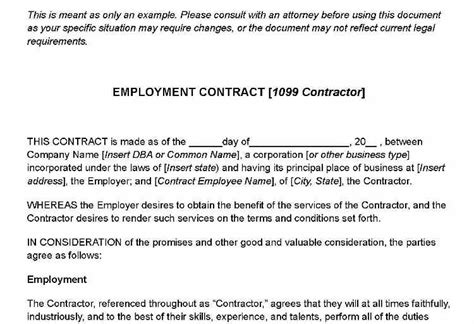Explaining Employment Contracts In English

Employment contracts are legal agreements between employers and employees that outline the terms and conditions of employment. These contracts can be verbal or written, but it is always best to have them in writing to avoid any misunderstandings or conflicts in the future. This article will explain everything you need to know about employment contracts in English.
1. Introduction
In this section, we will discuss the basics of employment contracts and their importance in the workplace.
What is an employment contract?
An employment contract is a legally binding agreement between an employer and an employee that outlines the terms and conditions of employment. It includes information such as job duties, compensation, benefits, and any other relevant details.
Why are employment contracts important?
Employment contracts are important because they protect both employers and employees. They ensure that both parties understand their rights and obligations, and they help prevent misunderstandings and conflicts in the workplace.
What should be included in an employment contract?
An employment contract should include the following information:
- Job title and description
- Compensation and benefits
- Hours of work and overtime pay
- Vacation time and sick leave
- Termination and severance pay
- Non-compete and confidentiality agreements
2. Types of Employment Contracts
In this section, we will discuss the different types of employment contracts that exist.
Permanent Employment Contracts
Permanent employment contracts are the most common type of employment contract. They are full-time contracts that do not have an end date and have no fixed term.
Fixed-Term Employment Contracts
Fixed-term employment contracts are contracts that have a specific end date. They are often used for temporary work or for projects with a specific end date.
Part-Time Employment Contracts
Part-time employment contracts are contracts that specify a reduced number of hours per week compared to full-time work. They often come with reduced benefits and compensation.
3. How to Negotiate Employment Contracts
In this section, we will discuss how to negotiate employment contracts.
Research the Company
Before negotiating your employment contract, it is important to research the company. This will help you understand their values, culture, and expectations.
Know Your Worth
It is important to know your worth and what you bring to the table before negotiating your employment contract. Research industry standards and salaries to make sure you are getting a fair deal.
Be Clear About Your Expectations
Before negotiating your employment contract, be clear about your expectations. This includes compensation, benefits, and job duties. Make sure these are clearly outlined in the contract.
Seek Legal Advice
If you are unsure about any aspect of your employment contract, seek legal advice. A lawyer can help you understand your rights and obligations as an employee.
4. Conclusion
Employment contracts are a crucial part of the employer-employee relationship. They protect both parties and ensure that everyone is on the same page. By understanding the different types of employment contracts, how to negotiate them, and what should be included, you can ensure that you have a positive employment experience.
5. FAQs
Q: What is the difference between an employment contract and an offer letter?
A: An offer letter is a document that outlines the terms of a job offer, while an employment contract is a legally binding agreement that outlines the terms and conditions of employment.
Q: Can an employment contract be changed?
A: Yes, an employment contract can be changed, but both parties must agree to the changes and they must be documented in writing.
Q: What happens if an employer breaches an employment contract?
A: If an employer breaches an employment contract, the employee may be entitled to damages or other remedies. It is important to seek legal advice in these situations.
